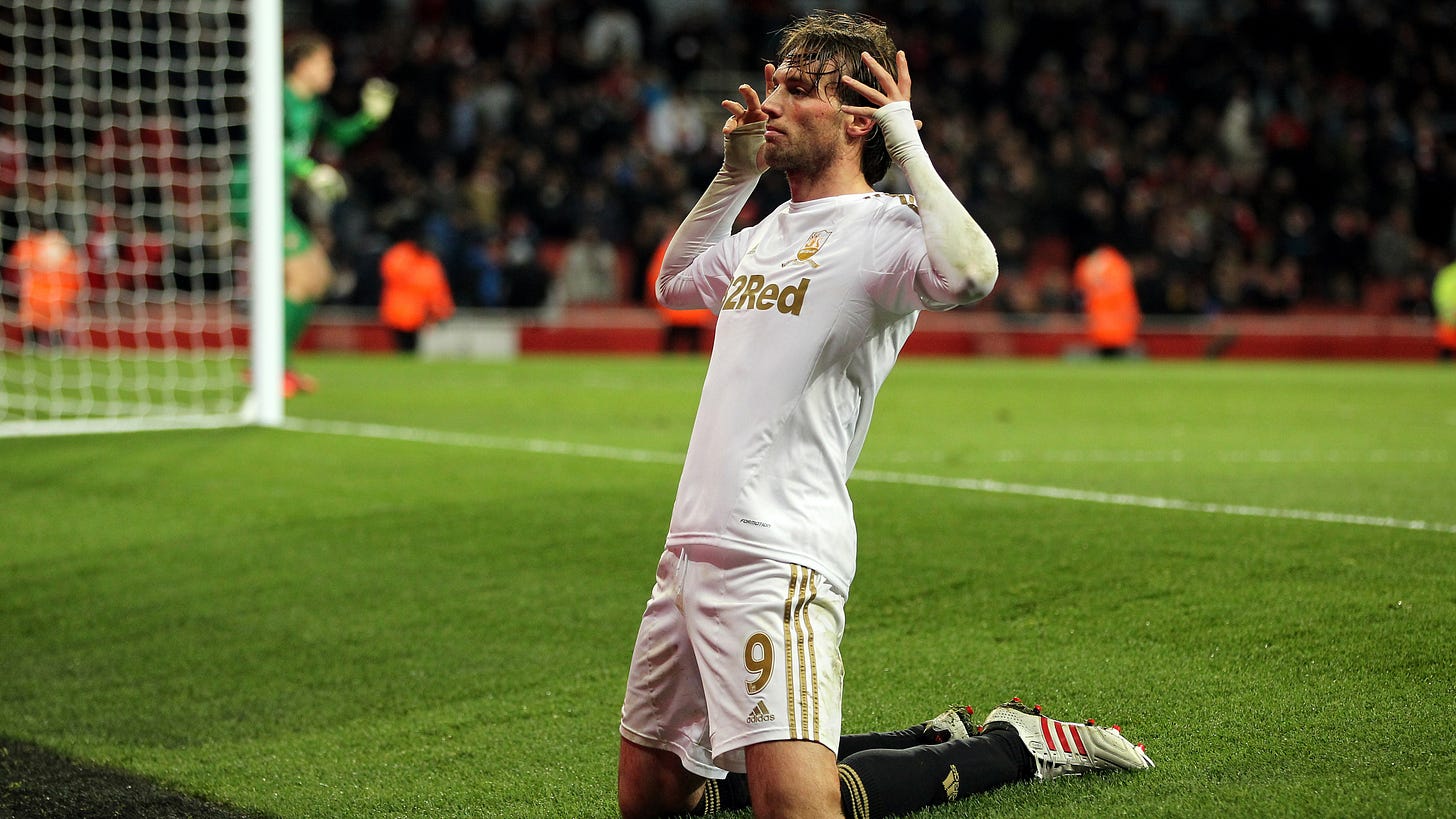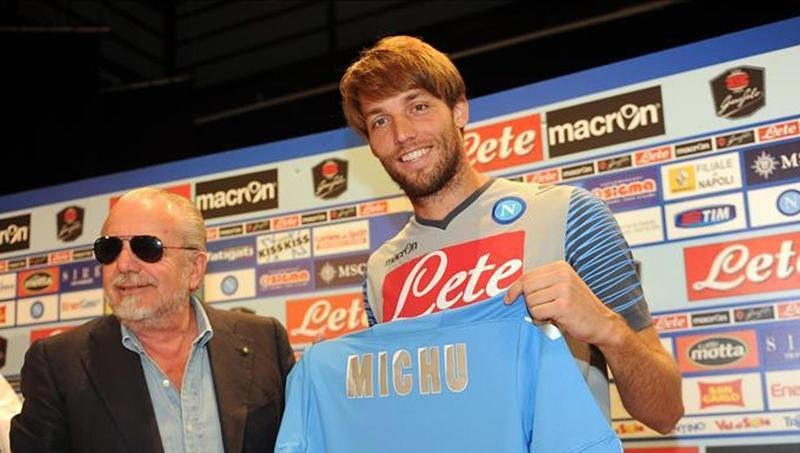Welcome to another edition of Untold Football Stories and today, we will be exploring the story of Michu. Michu’s roots in football traced back to his deep family connection with Real Oviedo, where he and his brother honed their skills at the club’s academy.
Back then, Real Oviedo was a major club, envisioning a grand future with a new stadium. But a sudden relegation shattered their dreams, leading to financial struggles and a rapid descent to the lower divisions. Michu, initially hopeful, saw his aspirations dim as the club plummeted.
Despite moving to Celta de Vigo, he remained connected to Real Oviedo, eventually contributing to the club’s revival alongside other former players.
At Celta de Vigo, he encountered a similar tale of redemption, joining a team that fluctuated between success and relegation, reflecting the rollercoaster trajectory of his career.
The 22-year-old initially found himself in Celta’s B team, yet his remarkable goal-scoring abilities quickly earned him a spot in the main squad, propelling him through a whirlwind of achievements.
His performance improved impressively, leading to an opportunity to join La Liga’s Sporting Gijon, which he shockingly declined due to their rivalry with his beloved childhood club, Real Oviedo. This decision led to his iconic “I don’t hear you now” celebration, a retort to teasing, especially significant when he later guided Celta to the promotion playoffs, despite missing a crucial penalty.
Moving to Rayo Vallecano as a free transfer, where he joined Diego Costa, Michu found himself amid the club’s dramatic narrative. Rayo, once giant killers in the UEFA Cup, had undergone relegations and resurgences, coincidentally reaching La Liga again the same year Michu joined.
This time, his contribution was pivotal, playing as a left midfielder and delivering a standout season. His remarkable performance included scoring two goals against Real Madrid, the fastest coming just 15 seconds into the match at the Bernabeu, a record-setting feat. Ending the season as La Liga’s highest-scoring midfielder with 15 league goals, Michu’s prowess caught the eye of Michael Laudrup, one of the league’s legends.
Michael Laudrup took the reins at Swansea, a newly-promoted Welsh team entering the Premier League. Amidst their high-profile signings, Laudrup’s acquisition of a 27-year-old from Rayo Vallecano for just £2 million went somewhat unnoticed initially. Yet, those in the know understood Michu’s arrival wasn’t sudden; Laudrup, with his eye for talent and deep Spanish football knowledge, recognized the gem he was bringing to the Premier League.
On the club’s 100th-anniversary celebration, decked in their special gold and white kit, Michu quickly proved himself as the man with the golden touch. Ahead of his debut at Loftus Road, forewarned about the Premier League’s challenging away games, Michu not only scored eight minutes into the game but added another goal and two assists, propelling Swansea to a resounding 5-0 victory.
However, what truly resonated with fans was Michu’s down-to-earth nature and infectious enthusiasm. Despite his on-field brilliance, he remained an approachable, humble figure. His father flew in from Spain every weekend to watch him play, he steadfastly stuck to his siesta routine and openly admitted his post-match love for fabada.
By Christmas, he had become the Premier League’s leading scorer, eclipsing the likes of Suarez, Bale, and Van Persie, despite his unconventional position.
His adaptability allowed him to seamlessly shift roles, alternating between secondary forward, number ten, or even the left side of the pitch – an incredible display of versatility.
A year after making his debut in the top tier of Spanish football, this 27-year-old emerged as the Premier League’s most talked-about player. Sir Alex himself hailed the £2 million deal, admitting, “It was a brilliant piece of business, I hadn’t even heard of him.”
With an arsenal of skills from headers to finesse shots, he drew attention for his affinity for facing big teams like Liverpool, Manchester United, and Tottenham, notably netting three goals against Arsenal. Even when his form dipped, he delivered a stunning curler against Chelsea in the League Cup semi-final, securing Swansea’s maiden appearance in a cup final, a special gift for their 100th anniversary.
For the Swansea faithful, Michu was nothing short of an angel descended from the heavens.
However, in one of football’s greatest underdog stories, Michu played a pivotal role, scoring against Bradford City in the final to secure the trophy, after their astonishing victories over Arsenal and Aston Villa despite playing in the English fourth tier. To this day, Swansea’s only major trophy remains that which earned them their sole shot at the Europa League.
Michu, in turn, received a new contract, continuous praise from Laudrup, and numerous offers from top European clubs, including a £30 million bid from Arsenal, all rejected by Swansea. Yet, a call he couldn’t resist was his maiden call-up to the Spanish national team, a stark contrast to his earlier disbelief when asked about it, stating, “Impossible, they’re the best team in the world.”
However, once the next season commenced, the world almost believed this wasn’t a distant dream. With five goals and two assists in ten matches by the end of September, he was hailed as the improbable late bloomer. Unfortunately, an injury interrupted his streak, causing him to miss a match, and upon his return, his form waned.
He struggled, managing only one goal in seven matches before succumbing to a knee problem that sidelined him for a month.
Upon his return, another setback followed this time with an ankle injury, keeping him out for three months. As the season concluded, seven months had passed since his initial glory. He played just 11 matches, failing to score and only providing a single assist.
During that time, an injury prevented his second call-up for Spain and shattered his chances of participating in the World Cup, coinciding with Swansea’s declining performance and the sacking of Laudrup amidst a corruption scandal involving agents bribing him to influence player signings.
In a desperate bid to revive his career, a dejected Michu was loaned to Napoli by Swansea, but his impact dwindled rapidly. After just six matches, fans almost forgot his name, and a minor injury sidelined him. Medical exams revealed the grim reality—a year after his initial ankle injury, Michu was diagnosed with periostitis, a chronic inflammation around his ankle.
Realizing the persistent pain wouldn’t fade, his time with Napoli abruptly ended; he never played for them again.
Following four surgeries and mounting letters from fans bidding farewell, Michu decided to terminate his contract with Swansea. Despite featuring in only 67 matches, his influence had left an indelible mark on the club. At this point, 441 days had passed since his last match.
Doctors assured him it was a common injury, manageable with medication, but despite his adherence to their directives, the pain persisted, preventing him from performing at his peak. When he expressed his decision to join his brother’s coaching team in the third division due to the ongoing pain, those around him doubted its legitimacy. They questioned the severity of his injury, influenced by doctors’ assertions that it wasn’t severe.
Even amidst multi-million-dollar offers from clubs like Aston Villa, urging him to give it one last shot, Michu declined. He firmly stated, “As a person, you have to be honorable and honest… I knew I couldn’t give them my best, and if I could, it would have been for Swansea, not Villa.”
Ultimately, just a year after his stint with Napoli, Michu found himself at Union Langreo, under the guidance of his brother. Surprisingly, despite struggling to even complete a few laps during warm-ups due to his physical limitations, he showcased an impressive performance, notching 12 goals in 17 matches.
Nevertheless, Real Oviedo extended an offer to their prodigal son, granting him the chance to return and play for his childhood team, fighting for promotion to La Liga in the cherished stadium where his dreams had once flourished.
In the end, the experience wasn’t all bleak. Despite retiring prematurely at the age of 31 due to the relentless pain, his brief tenure at Real Oviedo allowed him a symbolic victory lap. However, in a later interview, Michu revealed a darker truth: his ankle had deteriorated to the point where walking down the street became excruciating.
For the man who had mesmerized the Premier League, effortlessly gliding across the field, this reality was a stark contrast. When asked about his time at Swansea, he likened it to attempting to recall a dream upon waking—a surreal and distant memory for everyone involved.
Stay connected with us for more captivating content, exclusive behind-the-scenes glimpses, and thrilling offers. Follow us on our social media platforms for daily updates, sneak peeks, and engaging discussions.









